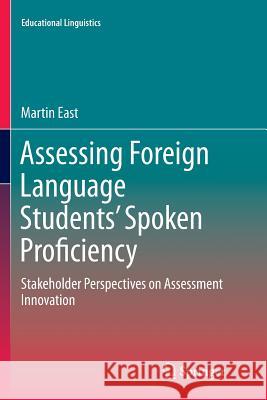Assessing Foreign Language Students' Spoken Proficiency: Stakeholder Perspectives on Assessment Innovation » książka
topmenu
Assessing Foreign Language Students' Spoken Proficiency: Stakeholder Perspectives on Assessment Innovation
ISBN-13: 9789811091285 / Angielski / Miękka / 2018 / 227 str.
Assessing Foreign Language Students' Spoken Proficiency: Stakeholder Perspectives on Assessment Innovation
ISBN-13: 9789811091285 / Angielski / Miękka / 2018 / 227 str.
cena 201,24
(netto: 191,66 VAT: 5%)
Najniższa cena z 30 dni: 192,74
(netto: 191,66 VAT: 5%)
Najniższa cena z 30 dni: 192,74
Termin realizacji zamówienia:
ok. 16-18 dni roboczych.
ok. 16-18 dni roboczych.
Darmowa dostawa!
Kategorie:
Kategorie BISAC:
Wydawca:
Springer
Seria wydawnicza:
Język:
Angielski
ISBN-13:
9789811091285
Rok wydania:
2018
Wydanie:
Softcover Repri
Ilość stron:
227
Waga:
0.35 kg
Wymiary:
23.39 x 15.6 x 1.32
Oprawa:
Miękka
Wolumenów:
01
Dodatkowe informacje:
Wydanie ilustrowane











